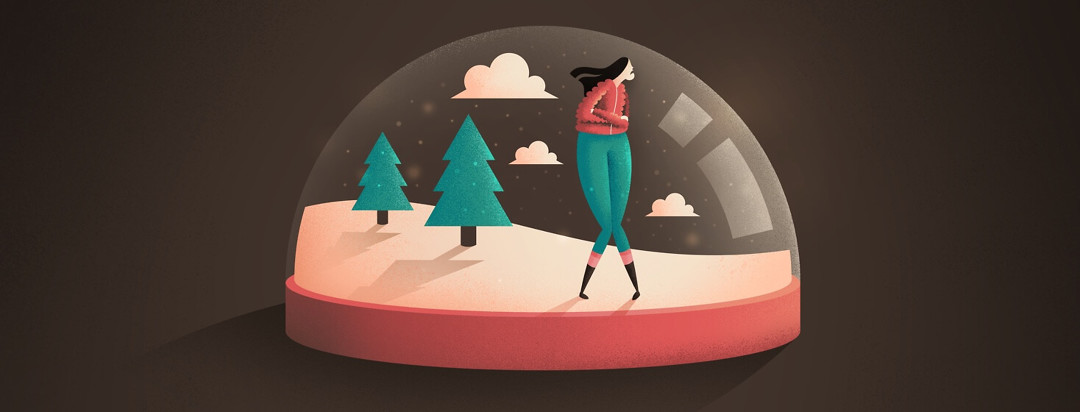Myeloma, Like a Minnesota Winter
On the drive to my son's school this morning, we saw the sheriff go by, lights blazing and sirens blaring. The roads this time of year become icy as temperatures hover around freezing. Winter accidents have officially begun, and before long it will feel like a true icebox here in northern Minnesota, with snow banks higher than stop signs and temperatures lower than kitchen freezers. I’ve always felt that winter brings more inconvenience and difficulty than all other seasons combined. In many ways, enduring a winter in Minnesota feels like living with multiple myeloma.
The roads can be slippery
Driving on Minnesota roads in the winter is a lesson in patience and adaptability. Roads can be unpredictably and dangerously slippery. Being in a hurry is a surefire way to end up in the ditch. On one of our January trips to Rochester, we saw dozens of cars buried in snow, their occupants awaiting rescue. Slippery, snow-covered roads beg us to pay attention to road and weather conditions and alter our speed accordingly, even if it means taking a lot longer to get where we want to go.
My year-and-a-half-long journey with multiple myeloma has had more than its share of icy patches. A hip fracture, two painful surgeries, a miserable transplant, and continuous, disabling side effects have ensured that I heed my own physical and emotional conditions before stepping too hard on the gas. More than once I’ve needed to be pulled out of emotional and physical ditches from attempting too much, too fast and trying to get where I want to go too quickly.
Our mental health can suffer
Like cancer, winter leaves us more vulnerable to anxiety and depression. Winter means shorter days and longer nights. Many in these northern climates suffer from seasonal affective disorder (SAD). It’s something we acknowledge as a very real threat to our mental health during the winter months. We buy sun lamps and take extra vitamin D in hopes of avoiding the plunging depths of a seasonal depression.
Last winter, I got home from my transplant around Thanksgiving. It was cold and snowy and, although technically still autumn, felt in every way like winter. It was an unusually long, frigid, and snowy winter, and I had just gone through one of the biggest personal storms of my life. I felt depressed before winter even started. I’ve learned since that many of my MM friends deal with melancholy and feelings of anxiety and depression from time to time, especially after transplant.
Storms bring everything to a halt
Minnesota is notorious for its snow storms causing numerous delays and cancellations. Schools begin late, end early, or don’t open at all. Flights are postponed, runways are shut down, and passengers become stranded. Travel is advised only if absolutely necessary, roads are closed, and drivers get stuck in their own driveways. During the severe storms of winter, most people prefer to stay home, keep warm and wait for the inclement weather to pass.
Our storms with cancer are no different. They can easily derail us and postpone or cancel our plans. A medical or mental storm is enough to make us pass on social engagements and choose instead to hunker down in the safety and security of home. We can become stranded, too, and feel stuck, spinning our wheels fruitlessly in the deep ruts of our minds. But the storms of winter pass eventually, and so too will ours. And with any luck, we will get help shoveling ourselves out.
We need to shovel
Last winter, we got almost 100 inches of snow. Snowplow drivers worked overtime, removing massive amounts of snow from driveways, roads and parking lots. Snowdrifts in town became dangerously high, creating visibility hazards that eventually had to be hauled away in dump trucks. We shoveled and snowblowed and shoveled some more. The snowmobilers, skiers, and other cold-weather enthusiasts welcomed this supersized helping of the white stuff, but nearly all of us grew tired of the extra work, added delays, and inconvenience.
A cancer diagnosis falls on us like a thick blanket of snow, bringing disruption, difficulty, and disappointment. We need to keep shoveling, clearing our path to get us where we want to go. We must dig deeper than we believe we can at times to remind ourselves of the green grass that still lies underneath all that snow. And it's okay to ask for help with the shoveling.
We can still find joy
As I expressed my aversion for the coming winter, my son disagreed. He said, “Mom, if you choose not to find joy in the snow, you will have less joy in your life but still the same amount of snow,” repeating an anonymous quote that has lingered in my mind ever since and which my labradoodle seems to have fully taken to heart.
I realize that a snowy winter is a faulty analogy. I could move away from the icy, cold winters of Minnesota, but I don’t have that choice with multiple myeloma. Still considered an incurable cancer, there is no choice but to endure the sometimes harsh winters that the disease inevitably brings.
But I can choose to embrace the joys, no matter how small, in the flurries that will fall anyway. Winter tends to clear the stage for the growth and renewal in the next cycle of life. Even as we curse the hardships of winter, we can still learn to smell the dormant roses that lie buried underneath even the highest pile of snow.

Join the conversation